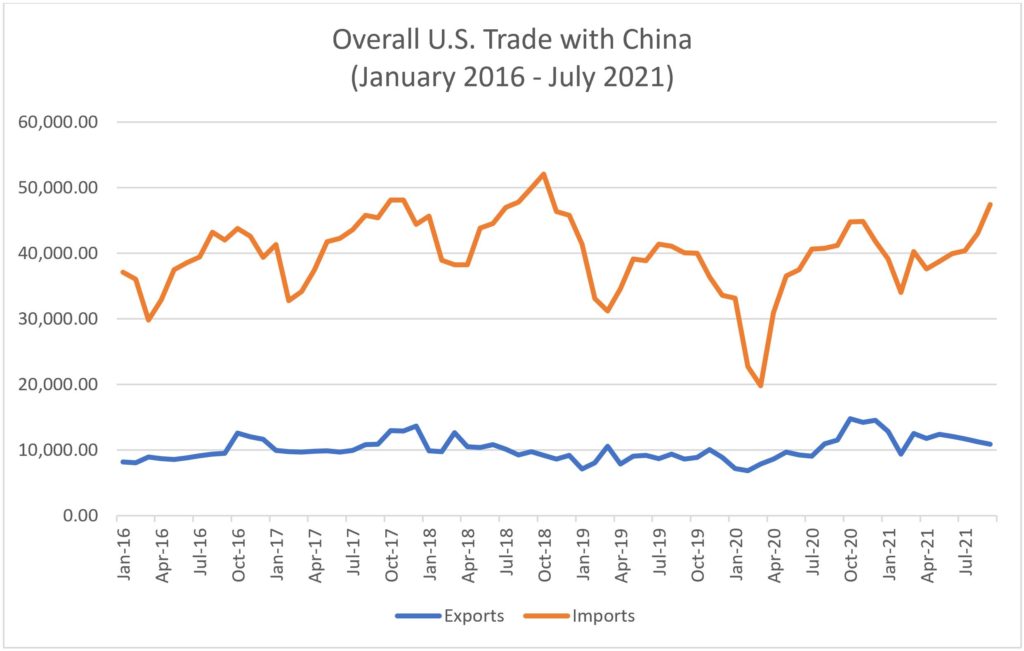
Adjunct Fellow, Trade 'n Technology Program
Cover Image Source: Getty Images

Although we don’t hear about it every day, the U.S. and China remain locked in a trade war. U.S. tariffs on $350 billion in Chinese products continue to impose additional costs on U.S. firms using Chinese-produced inputs and finished products as well as on consumers. Due to the COVID-19 pandemic, China has been unable to live up to its promises in the Phase One trade deal to purchase $200 billion in U.S. agricultural and other products. Meetings between the Biden and Xi administrations have not resulted in any firm resolution to the trade war, so what can be said about the trajectory of the U.S.-China trade relationship?
We first look at what occurred during the Biden-Xi administration meetings. Presidents Xi and Biden met on November 15 to discuss a variety of issues, including trade, which was mentioned briefly. Biden stressed the need for China to purchase additional goods from the U.S. according to the Phase One trade deal. Xi emphasized the “mutually beneficial” trade relationship between the two countries and asked the U.S. to stop using the reason of national security to “suppress Chinese businesses,” referring to the U.S. list of banned Chinese companies.
The meeting was not well accepted by the Chinese side. Qin Gang, China’s ambassador to the U.S., pushed back against Biden’s request for China to play by the ‘rules of the road,’ asking what the rules are, and who made them. Chinese Foreign Minister Wang Yi stated that the U.S. should honor commitments reached in the summit on Taiwan and spoke against the U.S. means of allying itself with other nations against China.
Previous meetings between officials in the Biden and Xi administration were not as equable. During the meeting between Secretary of State Antony Blinken and Chinese Communist Party foreign affairs chief Yang Jiechi in Alaska, the meeting opened on a negative note when Blinken started with a list of U.S. grievances against China, and Yang responded defensively and called out the U.S. for overstretching its power.
Wang Yi met with Deputy Secretary of State Wendy Sherman in July, outlining demands that the U.S. was not willing to meet. Wendy Sherman met with Chinese Ambassador to the U.S. Qin Gang in August, emphasizing the need to manage differences. While the former meeting maintained some contentiousness between the two nations, the latter meeting has been viewed as a courtesy and not a forum for negotiation.
The Biden administration is considering reducing tariffs on some products while increasing tariffs on key items that receive Chinese subsidies. Such items may include steel, solar panels, and semiconductors, for example. The President may justify this by highlighting China’s inability to meet the requirements of the Phase One trade deal. China’s purchases of U.S. goods reached only 58% of the target in 2020 and 68% of the target for the first nine months of 2021, according to Chinese import data. U.S. Trade Representative Katherine Tai has noted that top government officials are discussing the outcome of the Phase One trade deal, including China’s shortfall of commercial aircraft purchases.
Currently, the U.S. government has allowed companies to apply for tariff exemptions on over 500 products from China. This exemption process has allowed U.S. trade with China to remain relatively steady, despite some initial impact from the trade war and COVID-19. U.S. imports from China hit a low in March 2020, as COVID forced nations into lockdown, but imports were within a normal range by September 2021. Exports to China from the U.S. reached a high point in October 2020 and remain in the normal range.

Of course, this does not mean that the trade war has not had lasting effects. Many companies have had to absorb the additional cost of tariffs and/or pass them on to customers in the form of higher prices. Over 3,500 American businesses have filed lawsuits against the U.S. government over the tariffs placed on Chinese imports.
U.S. government complaints against China remain the same: China provides subsidies to Chinese firms in the high-tech and strategic industries; China has not fully addressed the issue of forced technology transfer, in which foreign firms are forced to provide Chinese partners with technology secrets, although the situation has improved due to China’s new law against the practice; and China should purchase more American products. The latter complaint, framed under the Trump administration as a situation in which the United States’ trade deficit with China was unfair, was addressed through the Phase One trade deal, in which China committed to purchase more agriculture, manufactured goods, energy, and service exports from the United States. China was unable to meet the targets, particularly due to the prevalence of the COVID-19 pandemic, but the Biden administration appears committed to upholding the requirements.
The Biden administration has not taken a radically different approach to China than the Trump administration and has moved slowly in improving relations between the two countries. While a more targeted trade war focusing on Chinese-subsidized products may make sense, much more remains to be done in order to reduce hostility between the countries, improve cooperation, and work toward upgrading world standards and guardrails in new technologies. Very little is being done in any of these areas, which is poor diplomacy.
To sum up, the trade war is still ongoing, and talks between the Biden and Xi administrations have not been fruitful in resolving pressing issues. Unfortunately, such ongoing tensions shape national views of the other nation-the U.S. with regard to China, and China with regard to the U.S. Heightening tensions may result in larger-scale conflict, which would damage economic growth and set back the U.S.-China relationship by decades. This is why the Biden administration needs to take a different tack.

The Institute for China-America Studies is an independent nonprofit, nonpartisan research organization dedicated to strengthening the understanding of U.S.-China relations through expert analysis and practical policy solutions.
1919 M St. NW Suite 310,
Washington, DC 20036
icas@chinaus-icas.org
(202) 968-0595
© 2025 INSTITUTE FOR CHINA-AMERICA STUDIES. ALL RIGHTS RESERVED.
Beijing’s approach to South China Sea tensions: reduce now, resolve later